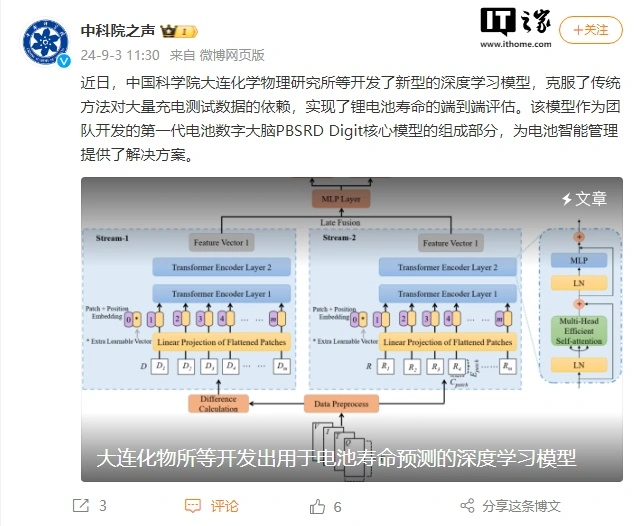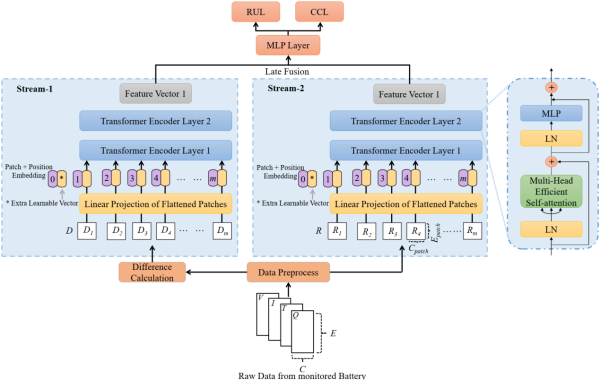 Technology peripherals
Technology peripherals
 It Industry
It Industry
 Dalian Institute of Chemical Physics, Chinese Academy of Sciences and others developed a deep learning model for battery life prediction
Dalian Institute of Chemical Physics, Chinese Academy of Sciences and others developed a deep learning model for battery life prediction
Dalian Institute of Chemical Physics, Chinese Academy of Sciences and others developed a deep learning model for battery life prediction
This website reported on September 3 that accurate prediction of lithium battery life is crucial for the normal operation of electrical equipment. However, accurate prediction of battery life faces challenges due to the nonlinearity of the battery capacity degradation process and the uncertainty of operating conditions. The Chinese Academy of Sciences stated that the team of researcher Chen Zhongwei and associate researcher Mao Zhiyu from the Power Battery and System Research Department of the National Key Laboratory of Energy Catalytic Conversion of the Dalian Institute of Chemical Physics, together with Professor Feng Jiangtao of Xi'an Jiaotong University, have made progress in battery health management research. Relevant research results have been published in the Journal of Transportation Electrochemistry of the Institute of Electrical and Electronics Engineers (DOI: 10.1109/TTE.2024.3434553 attached to this site).

- This model serves as a component of the first-generation battery digital brain PBSRD Digit core model developed by the team, providing a solution for intelligent battery management.
1. Battery life prediction model based on deep learning
This study proposes a deep learning model based on a small amount of charging cycle data. This model captures and fuses multi-time scale hidden features through the Vision Transformer structure and efficient self-attention mechanism to achieve accurate prediction of the battery's current cycle life and remaining service life.
- Prediction accuracy and generalization ability
At the same time, the model combines the remaining service life and The current cycle life prediction errors are controlled within 5.40% and 4.64% respectively. Furthermore, the model is still able to maintain low prediction errors when faced with charging strategies that do not appear in the training data set, demonstrating its zero-short generalization ability.
- Integration with Battery Digital Brain
This battery life prediction model is the first generation of Battery Digital BrainPBSRD Digit component. The researchers further improved the accuracy of the system by integrating the above model into the system.
- Deployment and Application
Currently, the battery digital brain system serves as the energy management core for large-scale industrial and commercial energy storage and electric vehicles and can be deployed on cloud servers and client embedded devices.
- Model optimization
This model balances prediction accuracy and computing cost, improving the battery digital brain for life estimation application value. In the future, the team will further optimize the model through model distillation, pruning and other methods to improve the system's robustness and resource utilization.
The above is the detailed content of Dalian Institute of Chemical Physics, Chinese Academy of Sciences and others developed a deep learning model for battery life prediction. For more information, please follow other related articles on the PHP Chinese website!

Hot AI Tools

Undresser.AI Undress
AI-powered app for creating realistic nude photos

AI Clothes Remover
Online AI tool for removing clothes from photos.

Undress AI Tool
Undress images for free

Clothoff.io
AI clothes remover

Video Face Swap
Swap faces in any video effortlessly with our completely free AI face swap tool!

Hot Article

Hot Tools

Notepad++7.3.1
Easy-to-use and free code editor

SublimeText3 Chinese version
Chinese version, very easy to use

Zend Studio 13.0.1
Powerful PHP integrated development environment

Dreamweaver CS6
Visual web development tools

SublimeText3 Mac version
God-level code editing software (SublimeText3)

Hot Topics
 1664
1664
 14
14
 1423
1423
 52
52
 1318
1318
 25
25
 1268
1268
 29
29
 1248
1248
 24
24
![Laptop battery suddenly dropped to 0% [Fixed]](https://img.php.cn/upload/article/000/000/164/170831283626613.jpg?x-oss-process=image/resize,m_fill,h_207,w_330) Laptop battery suddenly dropped to 0% [Fixed]
Feb 19, 2024 am 11:20 AM
Laptop battery suddenly dropped to 0% [Fixed]
Feb 19, 2024 am 11:20 AM
If your Windows laptop battery drops to 0%, it may cause an abrupt shutdown and cause you to lose unsaved work. This article will provide you with ways to fix this issue, as a sudden drop in battery power can be the result of a hardware or software issue. Fix Laptop Battery Suddenly Drops to 0% Issue If your laptop battery suddenly drops to 0%, here are some fixes to help you resolve the issue: Hard Reset Your Laptop Run the Power Troubleshooter Restore Default Power Schedule an update or reinstall your battery driver Roll back your battery driver Check your battery health Calibrate your laptop battery Update your basic input and output system There may be a problem with your battery Let's get started. 1] Hard reset your laptop first,
 Will data be lost when replacing the iPhone battery?
Feb 21, 2024 am 11:00 AM
Will data be lost when replacing the iPhone battery?
Feb 21, 2024 am 11:00 AM
Will iPhone data be lost when replacing the battery? As one of the best-selling smartphones in the world, iPhone has wide influence among user groups. However, as the use time increases, the battery capacity and performance will gradually decrease, resulting in a decrease in battery life. Therefore, many users choose to replace the iPhone battery to restore normal use of the phone. However, an important question for many people is: Will replacing the iPhone battery cause data loss? First of all, we need to make it clear that replacing the iPhone battery will not
 How to check iPad battery health
Feb 23, 2024 pm 08:43 PM
How to check iPad battery health
Feb 23, 2024 pm 08:43 PM
How to check the health of iPad battery? The health of iPad will decline over time, but most friends don’t know how to check the health of iPad. Next, the editor brings to users the pictures and texts of how to check the health of iPad battery. Tutorial, interested users come and take a look! How to check iPad battery health 1. First open iPad and enter the desktop, select [Settings] to open the function; 2. Then on the settings function page, slide the page and click [Battery] service; 3. Then jump to the battery service page, as shown below [Battery Health] indicated by the arrow; 4. Finally, you can see the capacity border position with the highest battery health.
 Beyond ORB-SLAM3! SL-SLAM: Low light, severe jitter and weak texture scenes are all handled
May 30, 2024 am 09:35 AM
Beyond ORB-SLAM3! SL-SLAM: Low light, severe jitter and weak texture scenes are all handled
May 30, 2024 am 09:35 AM
Written previously, today we discuss how deep learning technology can improve the performance of vision-based SLAM (simultaneous localization and mapping) in complex environments. By combining deep feature extraction and depth matching methods, here we introduce a versatile hybrid visual SLAM system designed to improve adaptation in challenging scenarios such as low-light conditions, dynamic lighting, weakly textured areas, and severe jitter. sex. Our system supports multiple modes, including extended monocular, stereo, monocular-inertial, and stereo-inertial configurations. In addition, it also analyzes how to combine visual SLAM with deep learning methods to inspire other research. Through extensive experiments on public datasets and self-sampled data, we demonstrate the superiority of SL-SLAM in terms of positioning accuracy and tracking robustness.
 iPhone 16 series battery capacity exposed: Plus version reverse upgrade, not as big as the previous generation
Feb 08, 2024 am 10:48 AM
iPhone 16 series battery capacity exposed: Plus version reverse upgrade, not as big as the previous generation
Feb 08, 2024 am 10:48 AM
According to news on February 8, X user "MajinBu" recently exposed the battery capacity information of the iPhone 16 series. Judging from the leaked information, Apple is not only "squeezing out toothpaste" this year, but is even upgrading in reverse. Specifically, the battery capacity of iPhone16 is 3561mAh, iPhone16Plus is 4006mAh, and iPhone16ProMax is 4676mAh. For comparison, the battery capacity of iPhone15 is 3349mAh, iPhone15Plus is 4383mAh, and iPhone15ProMax is 4422mAh. The increase and decrease are as follows: iPhone16 battery capacity +
 Xiaomi Mi 14 Ultra debuts Xiaomi Jinshajiang battery: 8% smaller in size, 300mAh more in capacity
Feb 23, 2024 am 08:34 AM
Xiaomi Mi 14 Ultra debuts Xiaomi Jinshajiang battery: 8% smaller in size, 300mAh more in capacity
Feb 23, 2024 am 08:34 AM
According to news on February 22, Xiaomi Mi 14 Ultra will be officially released tonight. In addition to its powerful image capabilities, the new phone also performs well in terms of battery life. According to reports, Xiaomi 14Ultra debuts the Xiaomi Jinshajiang battery, which is 8% smaller in size and has a battery capacity increased by 300mAh to 5300mAh. It is the battery with the highest energy density in Xiaomi's history, reaching 779Wh/L. With this addition, the battery life is increased by up to 17%. Xiaomi Jinshajiang battery uses the latest generation of silicon-carbon anode technology, with a silicon content of 6%, the highest among Xiaomi batteries. Supports 1600 cycles, 80% retention rate. It is worth mentioning that the Xiaomi 14Ultra body power combined with the 1500mAh power of the camera handle brings the overall battery capacity to 6800mAh. also
 Super strong! Top 10 deep learning algorithms!
Mar 15, 2024 pm 03:46 PM
Super strong! Top 10 deep learning algorithms!
Mar 15, 2024 pm 03:46 PM
Almost 20 years have passed since the concept of deep learning was proposed in 2006. Deep learning, as a revolution in the field of artificial intelligence, has spawned many influential algorithms. So, what do you think are the top 10 algorithms for deep learning? The following are the top algorithms for deep learning in my opinion. They all occupy an important position in terms of innovation, application value and influence. 1. Deep neural network (DNN) background: Deep neural network (DNN), also called multi-layer perceptron, is the most common deep learning algorithm. When it was first invented, it was questioned due to the computing power bottleneck. Until recent years, computing power, The breakthrough came with the explosion of data. DNN is a neural network model that contains multiple hidden layers. In this model, each layer passes input to the next layer and
 Understand in one article: the connections and differences between AI, machine learning and deep learning
Mar 02, 2024 am 11:19 AM
Understand in one article: the connections and differences between AI, machine learning and deep learning
Mar 02, 2024 am 11:19 AM
In today's wave of rapid technological changes, Artificial Intelligence (AI), Machine Learning (ML) and Deep Learning (DL) are like bright stars, leading the new wave of information technology. These three words frequently appear in various cutting-edge discussions and practical applications, but for many explorers who are new to this field, their specific meanings and their internal connections may still be shrouded in mystery. So let's take a look at this picture first. It can be seen that there is a close correlation and progressive relationship between deep learning, machine learning and artificial intelligence. Deep learning is a specific field of machine learning, and machine learning




